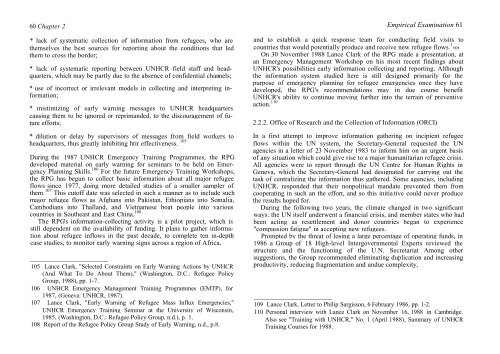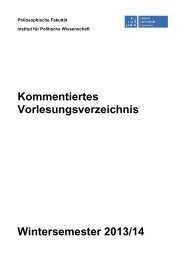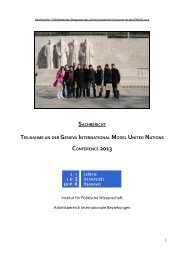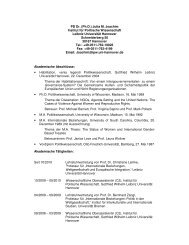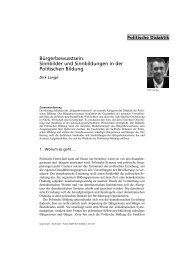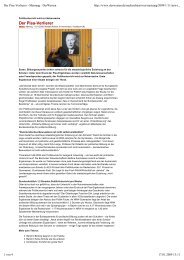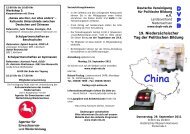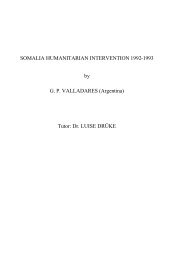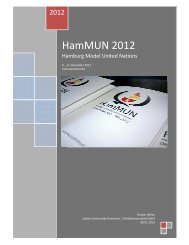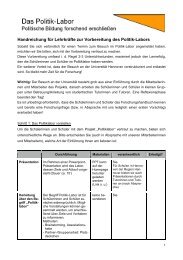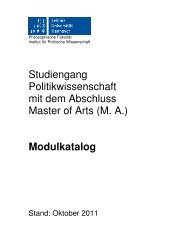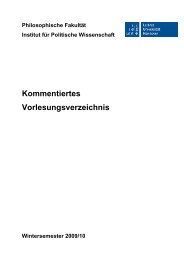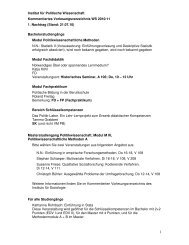Preventive Action for Refugee Producing Situations
Preventive Action for Refugee Producing Situations
Preventive Action for Refugee Producing Situations
You also want an ePaper? Increase the reach of your titles
YUMPU automatically turns print PDFs into web optimized ePapers that Google loves.
60 Chapter 2<br />
* lack of systematic collection of in<strong>for</strong>mation from refugees, who are<br />
themselves the best sources <strong>for</strong> reporting about the conditions that led<br />
them to cross the border;<br />
* lack of systematic reporting between UNHCR field staff and headquarters,<br />
which may be partly due to the absence of confidential channels;<br />
* use of incorrect or irrelevant models in collecting and interpreting in<strong>for</strong>mation;<br />
* mistimizing of early warning messages to UNHCR headquarters<br />
causing them to be ignored or reprimanded, to the discouragement of future<br />
ef<strong>for</strong>ts;<br />
* dilution or delay by supervisors of messages from field workers to<br />
headquarters, thus greatly inhibiting htir effectiveness. 105<br />
During the 1987 UNHCR Emergency Training Programmes, the RPG<br />
developed material on early warning <strong>for</strong> seminars to be held on Emergency<br />
Planning Skills. 106 For the future Emergency Training Workshops,<br />
the RPG has begun to collect basic in<strong>for</strong>mation about all major refugee<br />
flows since 1977, doing more detailed studies of a smaller sampler of<br />
them. 107 This cutoff date was selected in such a manner as to include such<br />
major refugee flows as Afghans into Pakistan, Ethiopians into Somalia,<br />
Cambodians into Thalland, and Vietnamese boat people into various<br />
countries in Southeast and East China. 108<br />
The RPG's in<strong>for</strong>mation-collecting activity is a pilot project, which is<br />
still dependent on the availability of funding. It plans to gather in<strong>for</strong>mation<br />
about refugee inflows in the past decade, to complete ten in-depth<br />
case studies, to monitor early warning signs across a region of Africa,<br />
_________________________<br />
105 Lance Clark, "Selected Constraints on Early Warning <strong>Action</strong>s by UNHCR<br />
(And What To Do About Them)," (Washington, D.C.: <strong>Refugee</strong> Policy<br />
Group, 1988), pp. 1-7.<br />
106 UNHCR Emergency Management Training Programmes (EMTP), <strong>for</strong><br />
1987, (Geneva: UNHCR, 1987).<br />
107 Lance Clark, "Early Warning of <strong>Refugee</strong> Mass Influx Emergencies,"<br />
UNHCR Emergency Training Seminar at the University of Wisconsin,<br />
1985, (Washington, D.C.: <strong>Refugee</strong> Policy Group, n.d.), p. 1.<br />
108 Report of the <strong>Refugee</strong> Policy Group Study of Early Warning, n.d., p.8.<br />
Empirical Examination 61<br />
and to establish a quick response team <strong>for</strong> conducting field visits to<br />
countries that would potentially produce and receive new refugee flows. 1 «»<br />
On 30 November 1988 Lance Clark of the RPG made a presentation, at<br />
an Emergency Management Workshop on his most recent findings about<br />
UNHCR's possibilities early in<strong>for</strong>mation collecting and reporting. Although<br />
the in<strong>for</strong>mation system studied here is still designed primarily <strong>for</strong> the<br />
purpose of emergency planning <strong>for</strong> refugee emergencies once they have<br />
developed, the RPG's recommendations may in due course benefit<br />
UNHCR's ability to continue moving further into the terrain of preventive<br />
action. 110<br />
2.2.2. Office of Research and the Collection of In<strong>for</strong>mation (ORCI)<br />
In a first attempt to improve in<strong>for</strong>mation gathering on incipient refugee<br />
flows within the UN system, the Secretary-General requested the UN<br />
agencies in a letter of 23 November 1983 to in<strong>for</strong>m him on an urgent basis<br />
of any situation which could give rise to a major humanitarian refugee crisis.<br />
All agencies were to report through the UN Centre <strong>for</strong> Human Rights in<br />
Geneva, which the Secretary-General had designated <strong>for</strong> carrying out the<br />
task of centralizing the in<strong>for</strong>mation thus gathered. Some agencies, including<br />
UNHCR, responded that their nonpolitical mandate prevented them from<br />
cooperating in such an the ef<strong>for</strong>t, and so this initia tive could never produce<br />
the results hoped <strong>for</strong>.<br />
During the following two years, the climate changed in two significant<br />
ways: the UN itself underwent a financial crisis, and member states who had<br />
been acting as resettlement and donor countries began to experience<br />
"compassion fatigue" in accepting new refugees.<br />
Prompted by the threat of losing a large percentage of operating funds, in<br />
1986 a Group of 18 High-level Intergovernmental Experts reviewed the<br />
structure and the functioning of the U.N. Secretariat Among other<br />
suggestions, the Group recommended eliminating duplication and increasing<br />
productivity, reducing fragmentation and undue complexity,<br />
_________________________<br />
109 Lance Clark, Letter to Philip Sargisson, 6 February 1986, pp. 1-2.<br />
110 Personal interview with Lance Clark on November 16, 1988 in Cambridge.<br />
Also see "Training with UNHCR," No. 1 (April 1988), Summary of UNHCR<br />
Training Courses <strong>for</strong> 1988.


